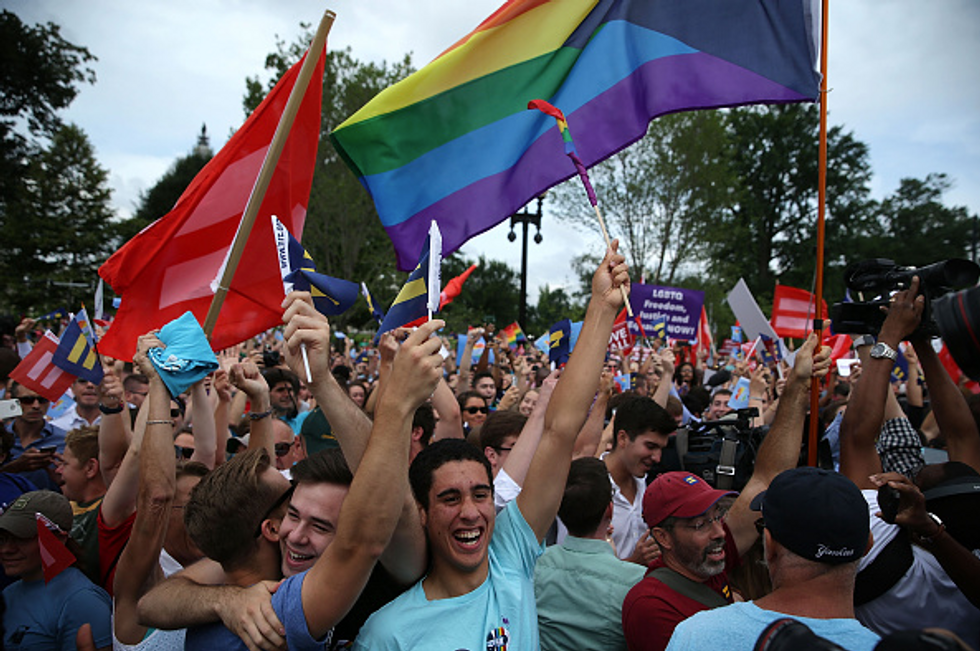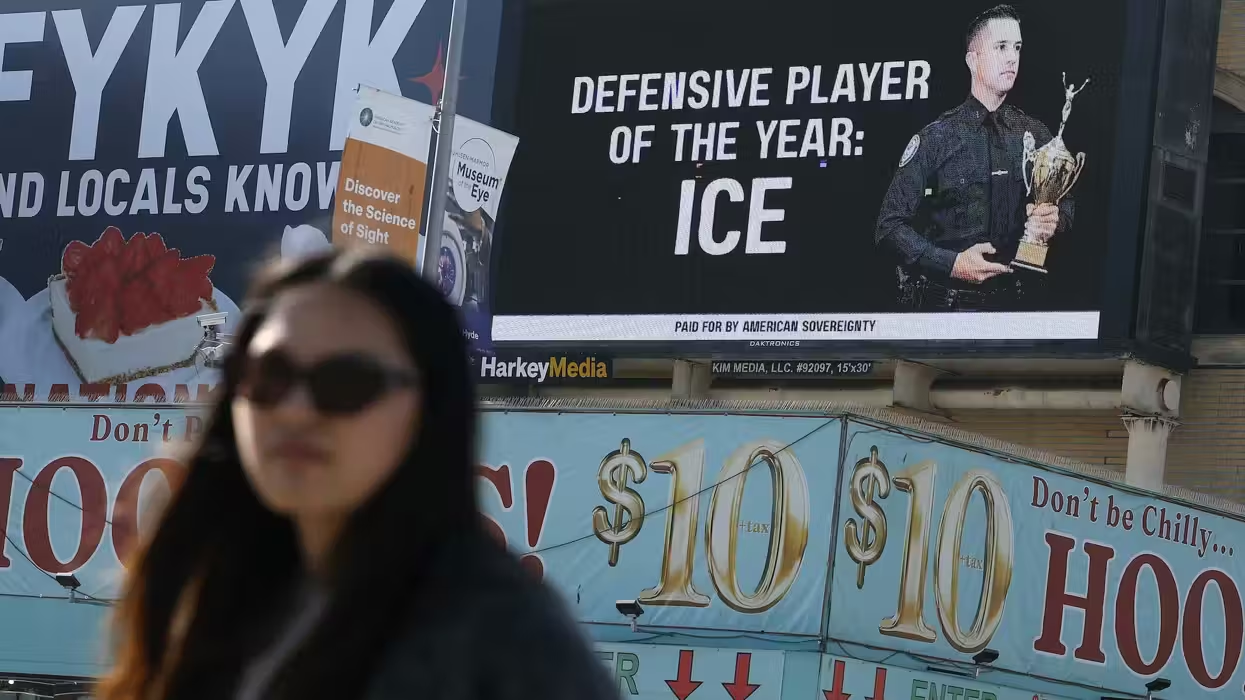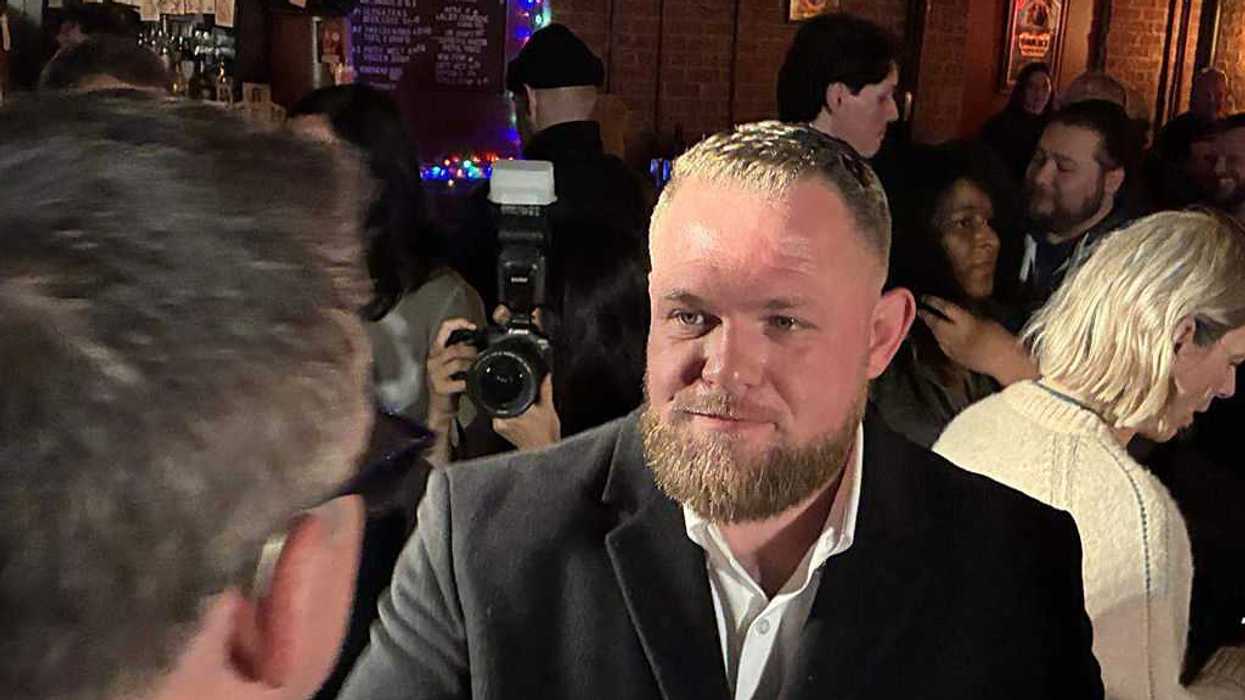There are a lot of objections to the Supreme Court’s declaration last week that same-sex couples have a right to marry. In fact, all four justices in opposition to the decision wrote their own dissents, and the media is overflowing with commentary, much of it negative.
But the court’s decision in Obergefell v. Hodges was not a surprise. About two-thirds of U.S. states had already allowed gay marriage or civil unions, and that was bound to force some sort of nation-wide endorsement.
Let me explain why, and then address some of the common objections to the ruling.
 WASHINGTON, DC - JUNE 26: Same-sex marriage supporters rejoice after the U.S Supreme Court hands down a ruling regarding same-sex marriage June 26, 2015 outside the Supreme Court in Washington, DC. The high court ruled that same-sex couples have the right to marry in all 50 states. (Photo by Alex Wong/Getty Images)
WASHINGTON, DC - JUNE 26: Same-sex marriage supporters rejoice after the U.S Supreme Court hands down a ruling regarding same-sex marriage June 26, 2015 outside the Supreme Court in Washington, DC. The high court ruled that same-sex couples have the right to marry in all 50 states. (Photo by Alex Wong/Getty Images)
A lot of people – for example, Glenn Beck – have said that government shouldn’t be involved in marriage, that it should be a private and/or religious matter. If two people want to get married and some house of worship wants to preside over it, go ahead.
But this contradicts the expectation we have that government intervene in marriage. Government routinely upholds all sorts of rights and obligations that married couples have. Spouses get to make medical decisions for one another if one of them is incapacitated; they raise the other’s children and claim their property if one of them dies; they can demand spousal support if they get divorced.
This isn’t simply about benefits, as Chief Justice John Roberts says, or about expressing love for someone. It’s also about responsibilities and duties that government enforces when it demands that a hospital respect a spouse’s decision about life support, or when it garnishes wages for child support.
In other words, we expect the government to support the decision of people to get married, and for that support to follow them from state to state. As such, once same-sex marriages or civil unions were offered in one state, it was inevitable that we’d face the issue of whether the rights and duties created between a gay couple in one state should be recognized in other states.
Would gay couples have to get re-civil-unioned in each new state they entered? Obviously, this would have been both burdensome and contrary to the blanket acceptance that heterosexual marriage has. There was bound to be a decision to recognize a gay marriage made in one state in all the other states as well.
So now that we’re here, is it a bad thing? Look at the objections.
“Marriage is about child-rearing, and same-sex couples can’t have kids.”
But lots of heterosexual marriages are childless, either by choice or infertility. Besides, adoption is available, and there’s little indication that children do any worse with gay couples than straight ones.
“Clergy will be forced to marry gay people, even if it’s against their religion.”
The ruling forces state governments to recognize gay marriages, but not churches and other places of worship to perform them. I know, bakers are required to bake wedding cakes for same-sex couples, which is ridiculous – you should be able to refuse service to any customer for whatever reason – but it would require a different ruling to force religions to marry gay couples. That’s unlikely to happen, and even the baker’s case can be appealed.
“Marriage is traditionally one man and one woman, you can’t redefine it.”
History says otherwise. Just look at the Bible, where marriage has been consistent with polygamy and concubinage. If marriage can be “re-defined” to change that, it can be redefined in other ways, can’t it?
“If gay marriage is OK between consenting adults, then so is incest and polygamy.”
This is a valid point, and, no, it’s not “comparing” homosexuality to incest and polygamy. It’s simply saying that the consenting adults standard applies equally to all three.
But, first of all, remember that incest and polygamy were features of marriage in the past. That’s not an argument in their favor, but a reminder that these are instances of previous redefinitions of marriage.
Plus, as distasteful as they may be, if they’re truly between consenting adults, then how do they justify government intervention or prohibition? We’re a nation of liberty in the spirit of John Stuart Mill: “the only purpose for which power can be rightfully exercised over any member of a civilized community, against his will, is to prevent harm to others.”
Beyond that, as titillating as the idea of polygamy is in the imagination, most people have enough trouble being a fulfilling partner to just one person, let alone a whole volleyball squad. And if incest is a mistake even between consenting adults, it’s a mistake that doesn’t harm anyone else. I would spend more time and effort worrying about domestic abuse or alcoholism in marriages.
I know this isn’t going to satisfy a lot of people’s worries. But with this ruling in place, straight people will still be able to marry, still be able to fulfill their duties to their spouse, and still able to get all the same tangible and intangible benefits from being married.
And I guarantee you, gay marriage isn’t going away.
–
TheBlaze contributor channel supports an open discourse on a range of views. The opinions expressed in this channel are solely those of each individual author.


 WASHINGTON, DC - JUNE 26: Same-sex marriage supporters rejoice after the U.S Supreme Court hands down a ruling regarding same-sex marriage June 26, 2015 outside the Supreme Court in Washington, DC. The high court ruled that same-sex couples have the right to marry in all 50 states. (Photo by Alex Wong/Getty Images)
WASHINGTON, DC - JUNE 26: Same-sex marriage supporters rejoice after the U.S Supreme Court hands down a ruling regarding same-sex marriage June 26, 2015 outside the Supreme Court in Washington, DC. The high court ruled that same-sex couples have the right to marry in all 50 states. (Photo by Alex Wong/Getty Images)






